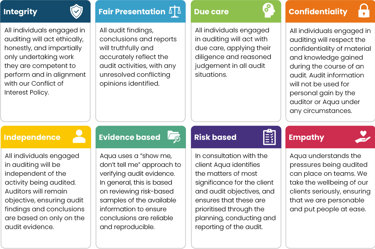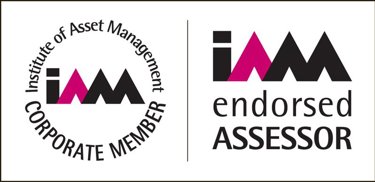
Technical regulatory assurance
With substantial industry experience and a practical perspective, we help regulated business performance in asset-intensive industries to achieve compliance and enhance value with reliable, insightful results every time. Our assurance helps water companies become more transparent in their actions, in line with the new Environment Act legislation, benefitting both the environment and society.
The way we approach audit is founded on the Institute of Internal Auditors three lines of defence model and is aligned with the approaches contained in ISO 19011:2018 guidelines for auditing management systems. We have proven experience that Ofwat accept our audits and adjusts funding in response.
We help you to:
- Navigate complex regulatory frameworks
- Achieve compliance
- Enhance performance
- Achieve board and stakeholder confidence
How we help

Independent third-party assurance

Internal audit

Business case assurance
Why Aqua Consultants?
Trusted partner
Practical expertise and proven performance since PR14 - Ofwat accept our audits and adjust funding in response.
Experience
17 years of assurance experience with regulated utilities industries.
Operational alignment
Closer to line 1/line 2 operations than competitors.
Insight
Cross-sector insight (regulator to customer).
Endorsed Assessor
An endorsed assessor for gap and certificate assessments for ISO 55001:2014 and PAS 55-1:2008 by the Institute of Asset Management.
Approach
Our approach to auditing follows the seven principles detailed in ISO 19011:2018, with an additional eighth principle unique to us.

Audit programme
We take a flexible approach to audit programme design to ensure the programme meets your needs – whether that be on single one-off pieces of assurance, or multi-year programmes covering multiple management systems. Our in-depth understanding of regulatory requirements and timescales allows us to tailor programmes to ensure requirements are met while adding value to you.
All our audit activity starts with establishing the context. This ensures a full understanding of organisational objectives, stakeholder requirements, and pertinent issues, as well as confirming information security and confidentiality needs.
Having established the context, we will then collaboratively design the audit programme with you while ensuring the integrity of the programme is maintained at all times. The programme will be designed to prioritise the assessment of areas of inherently higher risk or lower performance. The resulting programme is documented in our standard template and managed by a dedicated project manager for each audit programme. Every audit programme will have formal review points to assess the need for changes and identify improvement opportunities.
In establishing the audit programme objectives, we will work with you to understand the needs and expectations of internal and external stakeholders (including regulators). We will also consider the maturity of the management system being reviewed and any recent history of non-conformance or known risks and issues.
We recognise the importance of aligning scope across multiple audits, potentially being delivered by separate auditing companies. Our approach ensures a thorough understanding of the scopes of separate audit programmes and audits, seeking alignment with minimal overlap through the sharing of risk registers and joint meetings where appropriate, as detailed below.
We will establish a formal audit programme risk register at the start of every programme. This ensures risks relating to planning, resources, team selection, communication, implementation, document control, and availability are effectively mitigated. We will also review opportunities to maximise value by optimising the audit programme, aligning with client availability, and matching audit team to the level of capability required to achieve the audit objectives.
The audit programme will be established by the lead assurer. The lead assurer will be an industry expert in audit principles, methods, and processes. They will have an in depth understanding of the management system under audit, and any associated regulatory requirements. They will ensure appropriate continual professional development to maintain their competence to manage the audit programme.
The lead assurer is accountable for the following:
- Maintain independence from company management and delivery teams to ensure objectivity, having regard to the regulator
- Demonstrate technical competence in infrastructure delivery, assurance, and the sector
- Assure the credibility, governance and deliverability of regulated plans and delivery
- Base assurance judgements on verifiable evidence such as delivery schedules, risk registers, and governance documentation
- Produce clear, structured reports outlining assurance levels, risks, and alignment with regulatory expectations
To determine the appropriate level of resources required to deliver the audit programme, the lead assurer uses our audit resource allocator. This tool combines the number, extent and method of audit with an initial view of availability of documented information and other evidence to establish an estimate of the level of effort required. The tool is then used to allocate team members with the appropriate level of expertise to determine the total audit programme requirements. We then use our workbook tool to allocate and schedule the audit programme.
All our audit programmes begin with a kick-off meeting between the client and all individuals tasked with delivering the programme. This meeting covers the following elements:
- Define the objective, scope and criteria for each audit
- Confirm the audit methods to be applied
- Coordination and schedule of audits, including site visits if required
- Definition of operational controls to monitor audit programme performance
- Confirm ongoing communication programme
At the kick-off meeting, we also share a bespoke introduction slide which can be circulated to the people being audited to introduce Aqua Consultants and the scope of the audit
Each individual audit will be based on defined audit objectives, scope and criteria that align with the overall audit programme. The audit scope will include the locations, functions, activities and processes to be audited, as well as the time period covered by the audit.
The audit criteria will be the reference against which conformity is assessed. This may be based upon regulatory requirements, system specifications, codes of conduct, documented policies and procedures, or the risks and opportunities identified by the client.
We maintain audit records throughout the programme. These records include:
- Audit programme schedule and actual completion
- Audit programme RAID log
- Individual audit plan, report, supporting evidence (subject to information security constraints), corrective action log, and follow-on audit findings
- Audit resource allocator
- Lessons learned and continuous improvement log
The lead assurer will ensure the objectives and scope of each individual audit are met. They will review and approve all audit reports, ensuring consistency across each individual audit. The lead assurer will also assess the effectiveness of the proposed actions to address the audit findings based on the evidence presented and ensure that findings and reports are communicated to the client.
The Aqua Assure approach adds value by identifying any audit findings that may be of relevance to other processes or management systems that you use.
Continuous improvement is embedded within the Aqua Assure approach. We take a structured approach to capturing lessons learned after every audit, which enables the identification of potential areas of improvement. We use this feedback to review and optimise ongoing audit programmes, identify and enhance training and competency needs, and improve our client engagement where required.
Team Aqua Assure
Our auditors and assessors are at the heart of our Aqua Assure approach. They have over 100 years of experience between them, covering assurance of regulatory reports, price review submissions, company risk and controls, asset management systems, and delivery plans.
We have documented levels of experience and training requirement for each role within an audit team.
| Role | Qualification and experience required |
|---|---|
|
Lead assurer |
Extensive practical experience leading assurance programmes. Fellowship of relevant professional body (such as IAM, IAA, CIWEM, etc). |
|
Principal assurer |
Extensive practical experience leading individual audits. Member of relevant professional body (such as IAM, IAA, CIWEM, etc). Formal training in:
|
|
Senior assurer |
Practical experience delivering individual audits. Member of relevant professional body (such as IAM, IAA, CIWEM, etc). Formal training in:
|
|
Assurer in training |
Gaining experience in auditing. Member of relevant professional body (such as IAM, IAA, CIWEM, etc). Formal training in:
|
|
Technical expert |
Recognised expert in their technical area with associated qualifications and professional accreditations. |
We use our audit resource allocator tool to determine the audit requirements and ensure that an appropriately experienced auditor is allocated. This ensures you receive an excellent service with findings that can be trusted.
Key clients

You might also be interested in...
Achieve compliance and enhance value with reliable, insightful results every time
Our expert consultants are available to help you with your technical regulatory, business case, and data table assurance.
Contact our experts










